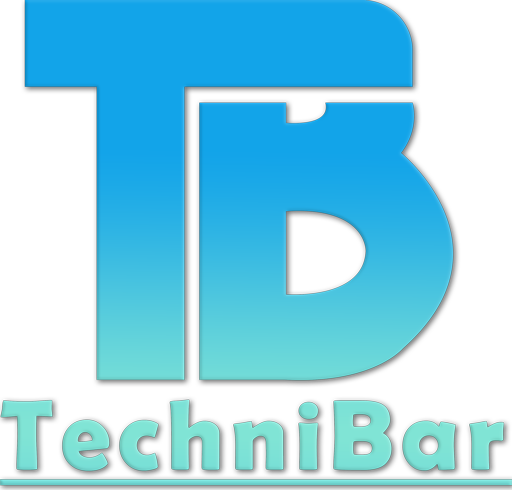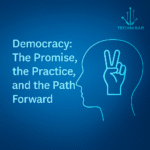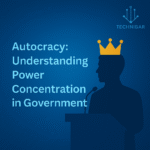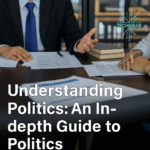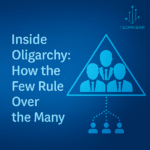A theocracy is the one in which the religious leadership or organization exercises. Political authority and the laws of the land are founded on religion or religious texts. In a theocratic state, there exists a lack of distinction between political power and religious power. It is muddy. This kind of government is based on ideology. That human actions ought to be led by God. And the laws of religion ought to be used as a basis of making lawful and ethical judgments.
In spite of the fact that today is the world political map. It is taken up by the flow of modern secular democracies. Theocracies still exist in some parts of the world. And do affect social and political life.
What is Theocracy?
Theocracy is a Greek term derived from the word theos (God) and kratos (rule or power). which means the rule of God. Depending on real-life experiences, theocracy is the rule of religious officers or rulers through interpretation and enforcement of the will of a God.
In a theocracy:
The constitution or legal code can be written in religious texts (Bible, Quran or Torah). In many cases the leading positions in government are characterized by religious leaders. Religious doctrine forms laws and rationalizes them. There is disagreement to religious interpretation that can constitute blasphemy or treason. A theocracy may be absolute in that religious heads enjoy unrestricted power or are limited where religion is seen to contribute to the government system together with other political forms.
Theocracy was born Historically
In all along human history theocracy has existed. Political power and religious power were integrated in ancient societies.
Ancient Egypt
The Pharaohs were thought of as gods on earth, which also was their political and religious top priest.
Israelite Kingdoms
Ancient Hebrew kingdom especially in the era of Moses and the Judges was ruled by divine commandments that were received by them through God and they comprised one of the earliest forms of theocracy.
Caliphates of Islam
Starting after the death of Muhammad Muslim-Caliphates (Rashidun, Umayyad, Abbasid) were founded and the rule of the Islamic law (Sharia) was introduced with the combination of religious and political power.
Medieval Europe
The Catholic Church was very powerful in the Middle Ages. The Pope had the power to excommunicate kings and launch Crusades and had power over European monarchs to provide a quasi theocratic setting in Christendom.
Important Differences of a Theocracy
There tends to be some common characteristics with theocratic governments:
Religion Law as Civil Law
The legal relationship is based on religious views or religious books. As an instance of basic content, in Islamic theocracies, Sharia law regulates such aspects of the existence as family, finance and criminal justice.
Regime headed by Religious leaders
Strong political roles are taken or directed by clergy or religious individuals who take great roles in decision making. In other countries, such as Iran, the Supreme Leader is an aged religious leader who wields more authority than politicians in a country.
Crushing of Religious Pluralism
Theocracies are mostly known to impose the superiority of a religion and suppress or subjugate other religions or beliefs.
Morality and Control of Morality
Religious police or authorities can keep tabs on individual behavior, impose codes of dress, prohibit some forms of entertainment, and quash any opposition that goes against religious teachings.
Contemporary Uses of Theocracy
Although they are not as numerous nowadays, theocracies still do exist and are politically influential.
Iran
Iran has existed as a Shi which has been ruled by a theocracy since their Islamic Revolution of 1979. A high ranking cleric holds the title of the Supreme leader, whose decision on any aspect of politics and religion is final. The law is under the Islamic thought in Iran and elections and laws are controlled by clerical councils.
Vatican City
The Vatican is a Christian theocracy which is ruled by the Pope who is both spiritual and political leader. Despite being small in size, it is a strong religious player both in terms of power and influence in affairs of different religions in the world.
Saudi Arabia
Though a monarchy in arms, Saudi Arabia is in effect a theocracy of the Sunni Islam. It has a Sharia law-based legal system and religious leaders are used as the key part of governance. Morality codes are enforced by religious police with the same having been moderated by recent reforms.
Taliban Afghanistan
The Taliban is an Islamist extremist organization that ruled the country according to a severe understanding of the Islamic laws, Sharia, between 1996 and 2001 and also since 2021. A large degree of freedom of expression has been banned by this regime, especially the rights of women, secular education.
Suggest To Read: What is Oligarchy?
Theocracy road benefits (By the Proponents)
According to the proponents of theocracy, the theocracy may afford a number of advantages especially in the very religious communities.
Moral Governance
It is common to observe that theocracy is an enabler of a moral code sanctioned by God, and it ensures a healthy moral code with which leaders and people can work.
Social Unity
A national congruence and cultural continuity can be advanced by a national belief system of religion in homogenous societies.
Consistency and Stability
Governance based on divine precepts is considered not to change with the movement of politics like the laws set by secularity.
Clear Authority
A theocratic leadership is usually regarded as being ordained by God which hinders the confrontation issue concerning legitimacy or political succession.
Weak points of Theocracy
Although theocracy might seem to have such advantages, there are also black clouds over the system, which carry serious risks and constraints.
Oppression of Individual Rights
In theocracy, freedoms of speech, religion, and gender equality are usually restricted. The dissenters or the critics can face severe penalties, under the law of blasphemy or apostasy.
d. Resistance to Modernization
Theocratic governments might be opposed to scientific developments, secular education and social reform in as far as they are perceived to be against religious teachings.
Also Read: What is autocracy?
Theocracy and Secularism
A deist government detaches religion and government meaning that there is no control of a particular religion over public policy. On the reverse, a theocracy mixes or puts it first in every venture of ruling.
- Feature
- Theocracy
- Secularism
The origin of the laws Source of laws The source of law is defined as the origin of law and can be characterized as follows: Where did this law originate? Why? Whose law is it? Whose standards does it matter? The law must have a source and this source of law depends on the person or reference made or referred to.
- Religious texts/doctrine
- Constitution law and civil law
- Leadership
- Religious leaders or religious leaders
- Man-made rulers (dependent on religion)
- Often restricted
- Typically protected
- Civil Rights
- According to religious explanations
- According to universal human rights
- Education
- Religious-centered
- Facts- and science-based
Is theocracy a form of democracy?
To a slight degree, there are a few theocracies which have some limited elements of democracies:
- Iran conducts presidential and parliamentary elections albeit the candidates are vetted through religion councils.
- Israel is a strong religious democracy which is not a theocracy.
- Spiritual government was historically an aspect of Tibet under the Dalai Lama but the present living in exile of Tibetan politics favors the structure of democracy.
Generally speaking, theocracy is associated more with the restriction to democratic freedoms, particularly when the religious figurehead possesses a veto over elected politicians.
Theocracy in the Modern World: Virile or Not?
And in the era of globalization, secularism, and human rights, theocracy has become less and less expanded, although, nevertheless, it still remains important in the world of the majority of societies because of the following reasons:
Cultural Identity
Religion is found to be strongly attached to national identity in most nations and individuals might find it desirable to have religious advice on governance.
Post-Conflict Governance
During conflict and also as a post conflict situation, religious movements can become political actors particularly where state institutions are not too strong.
Response to the Western Impact
Isolating the Western cultural, political or military domination, some theocratic movements are supported by providing the religious variant of the secular patterns.
The 21 st Century Challenges of Theocratic Rule
There are some major problems in modern theocracies:
Immigration Violations of Human Rights
There is an increasing amount of international pressure on any regime that suppresses feminine rights, religion, or the rights of LGBTQ+.
Internal Tensions
Interpretation is different, even in a single religion. Theocratic governments frequently cause infighting, sectarianism, or counter attacking movements within the reformist movements.
Integration in the Global environment
Due to the increasing globalization of commerce, technology and foreign affairs, theocracies might find it difficult to comply with the accepted norms and standards in the world.
Conclusion
A theocracy is such a forceful and historically influential government which merges and incorporates the spiritual power into control. Although it gives moral certainty and religious cohesion to certain communities, it, indeed, presents a challenge to civil liberties, pluralism as well as modernization. Today when the world is more and more connected and heterogeneous, the viability and relevance of theocracy is still in the discussion. Nature, beauty and the threat of a theocratic government is very much important to a student of world affairs, religion and human rights.
FAQS
1. What does a theocracy comprise?
A theocracy is one where people are governed by religious leaders or institutions, and religious texts or doctrines are used as the basis of the law. In theocracy the state is controlled either by divine ordinance or by construed religious expound.
2. Which are some of the examples of modern theocracies?
The modern day or current examples of theocracy are:
- Iran in which religious clerics exercise unreserved political power.
- Vatican City a territory directed by the Pope on grounds of catholic doctrine.
- Saudi Arabia, where legislation is grounded upon the Islamic law of Sharia, and where the heads of religion command influence in the procedure.
3. What is the contrast between theocracy and secular government?
In a theocracy political actions are informed by religious law and government and in most cases the religious law and government are not separated. Conversely, a secular government maintains a distinction between religion and state and this enables the ability to make laws and formulate policies without referring to religious doctrine.
Pros and drawbacks of a theocratic system?
Pros:
- Solid moral foundation
- spiritual and cultural oneness
- Stability in theological communities
Disadvantages:
- Restricted individual liberties
- suppression of minority views
- Opposition to contemporary or secular notions
5. Would a theocracy be democratic?
Some theocracies, including Iran, provide democratic aspects such as voting. However, religious leaders with the last word usually control them. Pure theocracies infrequently support full democratic rights. particularly when opposition, religion, or lifestyle choices are involved.
